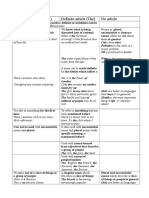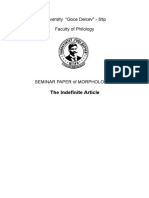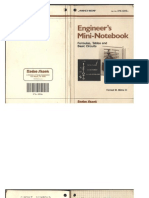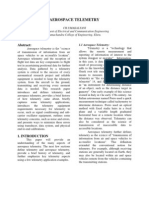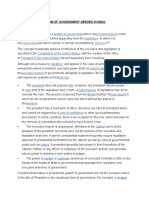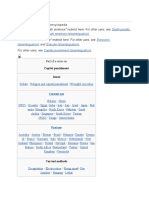English Has Two Articles: .: Some Important Grammar Rules Articles
English Has Two Articles: .: Some Important Grammar Rules Articles
Uploaded by
Uma KalyaniCopyright:
Available Formats
English Has Two Articles: .: Some Important Grammar Rules Articles
English Has Two Articles: .: Some Important Grammar Rules Articles
Uploaded by
Uma KalyaniOriginal Description:
Original Title
Copyright
Available Formats
Share this document
Did you find this document useful?
Is this content inappropriate?
Copyright:
Available Formats
English Has Two Articles: .: Some Important Grammar Rules Articles
English Has Two Articles: .: Some Important Grammar Rules Articles
Uploaded by
Uma KalyaniCopyright:
Available Formats
Some important Grammar Rules Articles Common Use of Articles
English has two articles: the and a/an. the = definite article- refer to specific or particular nouns a/an = indefinite article- used to modify non-specific or non-particular nouns Dont use singular countable nouns without articles. Have you seen the car key? (not *Have you seen car key? etc.) Dont use the with plural and uncountable nouns to talk about things in general. Politics is boring. (not *The politics is boring)/Apples are good for your health (not *The apples )
INDEFINITE ARTICLE A / AN
The choice between in definite article a/an is determined by SOUND. Use a for words beginning with consonant sounds. Use an for words beginning with vowel sounds.
An is used before a word beginning with a vowel sound: (a) Vowels with vowel sound: An eye, an elephant, an ox, an inkpot, an ear, an owl, an orange. (b) Before words beginning with a silent h: An hour, an heir, an honest man. (c) Consonants with vowel sound: An M.A., an S.D.O., an M.P. A before u and eu when they sound like 'you': a European, a university, a unit, uniform, a one rupee note Vowels with consonant sounds like w and y: a one-eyed donkey, a one-way ticket a one-rupee note ; a one-legged girl.
a useful book, a European a unique building, a university ;
Some native speakers use an before words beginning with h if the first syllable is not stressed An hotel (More Common a hotel) An historical building (More Common a hotel) , but a history class
INDEFINITE ARTICLE A / AN
The choice between in definite article a/an is determined by SOUND. Use a for words beginning with consonant sounds. Use an for words beginning with vowel sounds. An is used before a word beginning with a vowel sound: (a) Vowels with vowel sound: An eye, an elephant, an ox, an inkpot, an ear, an owl, an orange. (b) Before words beginning with a silent h: An hour, an heir, an honest man. (c) Consonants with vowel sound: An M.A., an S.D.O., an M.P. A before u and eu when they sound like 'you': a European, a university, a unit, uniform, a one rupee note Vowels with consonant sounds like w and y: a one-eyed donkey, a one-way ticket a one-rupee note ; a one-legged girl. a useful book, a European a unique building, a university ;
Some native speakers use an before words beginning with h if the first syllable is not stressed An hotel (More Common a hotel) An historical building (More Common a hotel) , but a history class
When the meaning is 'one', referring to a single object or person: I'd like an orange and two lemons please. Twelve inches make a foot. Not a word was said. In the sense of any( representative of a class): A pupil should obey his teacher. A cow is a useful animal
Use a/an to say what peoples professions or jobs are :Peter was a salesman, but he is now training to become an architect A particular person or thing in a group or class: Mary is training to be an engineer. He wants to be a dancer. With nationalities and religions: John is an Englishman. Kate is a Catholic. With names of days: I was born on a Thursday
When you refer to a kind of, or example of something: the mouse had a tiny nose the elephant had a long trunk, a very strange car With singular nouns, after the words 'what' and 'such': What a shame!, She's such a beautiful girl.
Notice also that we usually say a hundred, a thousand, a million.
A particular person or thing in a group or class: Mary is training to be an engineer. He wants to be a dancer. With nationalities and religions: John is an Englishman. Kate is a Catholic. With names of days: I was born on a Thursday
When you refer to a kind of, or example of something: the mouse had a tiny nose the elephant had a long trunk, a very strange car With singular nouns, after the words 'what' and 'such': What a shame!, She's such a beautiful girl.
We usually say a hundred, a thousand, a million.
DEFINITE ARTICLE - THEDEFINITE ARTICLE - THE
Use the with something which has already been mentioned so that both the speaker and listener know what is being talked about (There is an apple and a banana in the fruit bowl. The apple is red and the banana is yellow) Use the in sentences or clauses where we identify a specific person or object: The woman who painted this picture is famous. Which shirt did you choose? The blue one. / My car is the one parked in front. Oceans, seas: the Atlantic, the black sea Rivers: the Ganga,the Nile Canal: the Suez Canal Deserts: the Sahara Group of islands: The Andaman & Nikobar Island Mountain ranges: the Alps, the Himalayas Some countries (Including words like Republic/Kingdom):The United Kingdom, The USA Name of certain books: The Ramayana, The Vedas, the Iliad Things that are unique: the sun, the moon, the world, the earth Superlatives and ordinal numbers: the highest mountain, the smallest child, the first page, the third book, the last chapter. With adjectives, to refer to a whole group of people: the Italians, the Irish, the working class, the poor, the rich With decades, or groups of years: in the sixties, in the 1920s Before musical instruments: the flute, the guitar, the violin As an adverb with comparative: the more the merrier ,the less the better, The higher you ,climb, the cooler it gets. gets. The more they get, the more they want. The higher you climb, the cooler it
Omission of article
Before proper, material and abstract nouns used in a general sense: London, France, Tom, gold, rice, honesty, virtue: Rice is the main food in Asia. / Milk is often to tea in England. Water is gold. Honesty is the best policy. Wisdom is the gift of god. (BUT would you pass me the sugar on the table?/ The wisdom of grandmother is great.) Before plural nouns used to denote a class: Apples are red. Camels are useful animals. Warm clothes are necessary in cold climates. Before plural countable nouns: Children like chocolates. Computers are used in offices. Before a common noun used in its commonest sense: Man is mortal. Iron is a useful metal. The Common Nouns used in the widest sense: Man is a social animal. Animals have an underdeveloped brain. With names of countries (if singular): Germany is an important economic power. (But: I'm visiting the United States next week.) With the names of languages: French is spoken in Tahiti. English uses many words of Latin origin. With the names of meals: Lunch is at midday. Dinner is in the evening. (BUT I had a late dinner. The dinner we had at the hotel was very nice.) With people's names (if singular): John's coming to the party. (But: we're having lunch with the Morgans tomorrow.) Before names of games :She plays volleyball. They like football. With titles and names: Prince Charles is Queen Elizabeth's son./ President Kennedy was added
assassinated in Dallas. (BUT: the Queen of England, the Pope.) After the possessive case: His brother's car, Peter's house. With professions: Engineering is a useful career. He'll probably go into medicine. With names of shops: I'll get the card at Smith's./Can you go to Boots for me? With years: 1948 was a wonderful year./Do you remember 1995? With the names of individual mountains, lakes and islands: Mount McKinley is the highest mountain in Alaska. She lives near Lake Windermere. With most names of towns, streets, stations and airports: Victoria Station is in the centre of London. Can you direct me to M.G. Street?
With some fixed expressions:
by car ,by train, by air, on foot, on holiday, on air (in broadcasting), at school at home at work, at University, in church, in prison, in bed, from top to bottom
Note: Before a singular noun meant to represent the whole class When a singular noun is meant to represent a whole class to which it belongs, it is used with the definite article the. The cow is a useful animal. (Here the singular noun cow represents a whole class.) The rose is the sweetest of all flowers..
Note that these sentences can also be written using a plural noun without any article. Cows are useful animals. Roses are the sweetest of all flowers. A cow is a useful animal. (any cow representative of a class)
You might also like
- DK - English For Everyone, Level 3 Intermediate, Course Book True PDF (2020, DK Publishing) - Libgen - LiDocument288 pagesDK - English For Everyone, Level 3 Intermediate, Course Book True PDF (2020, DK Publishing) - Libgen - LiMohamed Ahmed100% (36)
- Grammar Is ImportantDocument98 pagesGrammar Is ImportantCaleb100% (1)
- English Grammar Today Book With CD Rom Sample PagesDocument10 pagesEnglish Grammar Today Book With CD Rom Sample PagesTaki Taki56% (9)
- Word Formation, Morphemes & Linguistic TreesDocument5 pagesWord Formation, Morphemes & Linguistic TreesBryan ValverdeNo ratings yet
- German Grammar - Liliane ArnetDocument4 pagesGerman Grammar - Liliane ArnetAymen Kamoun100% (1)
- Unit 1. The Definite Article. Theory and ExercisesDocument12 pagesUnit 1. The Definite Article. Theory and ExercisesizasbjNo ratings yet
- Definition: The Indefinite Article Is Just The Opposite of The Definite Article. in English, TheDocument8 pagesDefinition: The Indefinite Article Is Just The Opposite of The Definite Article. in English, ThegordansimNo ratings yet
- Mastering English Articles A, AN, and THE: Learn to Use English Articles Correctly in Every English Sentence!From EverandMastering English Articles A, AN, and THE: Learn to Use English Articles Correctly in Every English Sentence!Rating: 4 out of 5 stars4/5 (3)
- Some Frequently Asked Vocabulary in Placement PapersDocument18 pagesSome Frequently Asked Vocabulary in Placement PapersUma Kalyani74% (34)
- Ae Bt6 Test1Document4 pagesAe Bt6 Test1LuciliaNo ratings yet
- English ArticlesDocument20 pagesEnglish Articlesmasthan6yNo ratings yet
- Indefinite Article: A / An: 'An' With Nouns Starting With A Vowel (A, E, I, O, U)Document4 pagesIndefinite Article: A / An: 'An' With Nouns Starting With A Vowel (A, E, I, O, U)Fitri NurwanaNo ratings yet
- Articles A An TheDocument14 pagesArticles A An TheSilvia Alejandra SuarezNo ratings yet
- Articles: Definite, Indefinite, Zero: AandanDocument4 pagesArticles: Definite, Indefinite, Zero: AandanYanet Di PaoloNo ratings yet
- Articles & No ArticlesDocument6 pagesArticles & No Articlesx6q6ky4qdtNo ratings yet
- Indefinite and Definite ArticlesDocument7 pagesIndefinite and Definite ArticlesStephen MagudhaNo ratings yet
- Articles a, an theDocument6 pagesArticles a, an thesamanNo ratings yet
- Articles Use ExDocument3 pagesArticles Use ExEmmanuel CancheNo ratings yet
- The NOUN GROUP (Determiners, Modifiers & Pronouns)Document12 pagesThe NOUN GROUP (Determiners, Modifiers & Pronouns)Sorin MariusNo ratings yet
- Presentation SubmitDocument25 pagesPresentation SubmitAmna JavedNo ratings yet
- A Course of English Grammar - Kechyan - ArticleDocument13 pagesA Course of English Grammar - Kechyan - ArticlearpNo ratings yet
- ARTICLESDocument15 pagesARTICLESnikola90bbNo ratings yet
- The Articles LessonDocument4 pagesThe Articles LessoncrazybonoNo ratings yet
- Some and OthersDocument263 pagesSome and OthersigrenNo ratings yet
- The ArticleDocument12 pagesThe ArticlecarguibayNo ratings yet
- ArticlesDocument55 pagesArticlesAngeles Arjona SerranoNo ratings yet
- Lesson 6Document5 pagesLesson 6Johao Velasquez LovonNo ratings yet
- Articles: Laura Galindo. Adapted From New English File Upper - Intermediate. OxfordDocument12 pagesArticles: Laura Galindo. Adapted From New English File Upper - Intermediate. OxfordLauGalindoNo ratings yet
- Grammar Basics A1Document8 pagesGrammar Basics A1SairamTirumalaiGovindarajuNo ratings yet
- Cours Grammaire Anglaise L2 S2... 2023-2Document12 pagesCours Grammaire Anglaise L2 S2... 2023-2ndiayekamsa58No ratings yet
- Grammar Reference Articles Aandan A or An Means One Person or Thing. We Use A or AnDocument4 pagesGrammar Reference Articles Aandan A or An Means One Person or Thing. We Use A or AnСофья ВасильеваNo ratings yet
- Grammar.A-The-Zero ArticlemklDocument4 pagesGrammar.A-The-Zero Articlemklistow.74532050No ratings yet
- Use of articles-LECT-3Document33 pagesUse of articles-LECT-3Mohsin RazaNo ratings yet
- ArticlesDocument23 pagesArticlesarunanirmal2004No ratings yet
- Definite, Indefinite and Zero ArticleDocument3 pagesDefinite, Indefinite and Zero ArticleClaudio ColussiNo ratings yet
- Articles: A/an/the: Aptachaitanya & John Leads - English TrainingDocument21 pagesArticles: A/an/the: Aptachaitanya & John Leads - English Trainingkaru320No ratings yet
- Articles 1Document8 pagesArticles 1raghvendra singhNo ratings yet
- The Indefinite Article (A /an)Document4 pagesThe Indefinite Article (A /an)Luis Carlos Pimentel VignesNo ratings yet
- Articles in EnglishDocument7 pagesArticles in Englishlaxmikanthreddy200428No ratings yet
- How To Use English ArticlesDocument11 pagesHow To Use English ArticlesIbrahim GhazalNo ratings yet
- Nouns - Nationalities: See AdjectivesDocument5 pagesNouns - Nationalities: See AdjectivesLutfan LaNo ratings yet
- Indefinite Article (A/an) Definite Article (The) No ArticleDocument5 pagesIndefinite Article (A/an) Definite Article (The) No Articlemarusca-2No ratings yet
- Articles & DeterminersDocument13 pagesArticles & DeterminersLearning with Nasir KhanNo ratings yet
- Units 65,66,69,70Document31 pagesUnits 65,66,69,70saratorabianNo ratings yet
- Soft Skills Lab ManualDocument82 pagesSoft Skills Lab Manualaids2aitstptNo ratings yet
- Articles Full LessonDocument7 pagesArticles Full LessonNORMA ZOGHEIBNo ratings yet
- Advanced Articles A (An) vs. The - ENGLISH PAGEDocument10 pagesAdvanced Articles A (An) vs. The - ENGLISH PAGESujan AcharyaNo ratings yet
- DeterminersDocument26 pagesDeterminersZ_JahangeerNo ratings yet
- Seminar PaperDocument12 pagesSeminar Paperriki velkovNo ratings yet
- Articles 5Document4 pagesArticles 5idiazNo ratings yet
- Agreement: Mathematics, Politics, NewsDocument5 pagesAgreement: Mathematics, Politics, NewsdhietakloseNo ratings yet
- To Use The A and AnDocument3 pagesTo Use The A and AnRomán Sánchez MonsalveNo ratings yet
- 4.the Definite ArticleDocument4 pages4.the Definite ArticleScarp123No ratings yet
- English I: Ingeniero Jesús Paguaga Cel: 96940147Document78 pagesEnglish I: Ingeniero Jesús Paguaga Cel: 96940147Lenner Francisco González RodríguezNo ratings yet
- Definite and Indefinite ArticlesDocument7 pagesDefinite and Indefinite ArticlesAndrés Brando100% (1)
- Articles & Preferences FixDocument12 pagesArticles & Preferences FixnfairuzNo ratings yet
- Advanced Grammar For IELTS - ArticlesDocument21 pagesAdvanced Grammar For IELTS - ArticlesDrSushma PrajapatiNo ratings yet
- ArticlesDocument3 pagesArticlesMilitaru LuminitaNo ratings yet
- Articles: The Zero ArticleDocument54 pagesArticles: The Zero ArticleCristina KissNo ratings yet
- Completo Inglês (1)Document244 pagesCompleto Inglês (1)Lucas LourençoNo ratings yet
- English Grammar Today With CD ROM an a ZDocument216 pagesEnglish Grammar Today With CD ROM an a ZdemetmelihzanbakNo ratings yet
- ARTÍCULOSDocument26 pagesARTÍCULOSsenabriansergio4No ratings yet
- Articles The - An A - Non ArticleDocument3 pagesArticles The - An A - Non ArticleDaniel Silva NievesNo ratings yet
- The One English Grammar Handbook: Part 1 - A1 to B1From EverandThe One English Grammar Handbook: Part 1 - A1 to B1Rating: 5 out of 5 stars5/5 (1)
- I Before E (Except After C): Old-School Ways to Remember StuffFrom EverandI Before E (Except After C): Old-School Ways to Remember StuffRating: 4 out of 5 stars4/5 (5)
- Manual For Motorola Marco Personal Wireless CommunicatorDocument34 pagesManual For Motorola Marco Personal Wireless CommunicatorUma Kalyani100% (1)
- Mini-Notebook-Formulas Tables and Basic CircuitsDocument26 pagesMini-Notebook-Formulas Tables and Basic Circuitsjeyaganesh100% (2)
- Listed Below Are Uses With Examples, and The Structure of The Present Simple TenseDocument6 pagesListed Below Are Uses With Examples, and The Structure of The Present Simple TenseUma KalyaniNo ratings yet
- Word Synonym Synonym: List of Synonyms and AntonymDocument5 pagesWord Synonym Synonym: List of Synonyms and AntonymUma Kalyani100% (3)
- Subject - Verb AgreementDocument6 pagesSubject - Verb AgreementUma Kalyani0% (1)
- Spintronics: The Future of Digial WorldDocument15 pagesSpintronics: The Future of Digial WorldUma KalyaniNo ratings yet
- PrepositionsDocument9 pagesPrepositionsUma KalyaniNo ratings yet
- Aerospace TelemetryDocument12 pagesAerospace TelemetryUma KalyaniNo ratings yet
- Presidential Form of Government Needed in IndiaDocument4 pagesPresidential Form of Government Needed in IndiaUma KalyaniNo ratings yet
- Aerospace TelemetryDocument12 pagesAerospace TelemetryUma KalyaniNo ratings yet
- This Article Is About The Emigration Term. For Other Uses, SeeDocument19 pagesThis Article Is About The Emigration Term. For Other Uses, SeeUma KalyaniNo ratings yet
- Capital PunishmentDocument29 pagesCapital PunishmentUma KalyaniNo ratings yet
- Diode Turn-On and Off TimeDocument50 pagesDiode Turn-On and Off TimeUma Kalyani100% (1)
- Ic Ecad Lab Manual Online PanoramaDocument72 pagesIc Ecad Lab Manual Online PanoramaChaitanya Chakka100% (3)
- Fading: This Article Is About Signal Loss in Telecommunications. For The Poetry Book, See - For Other Uses, SeeDocument8 pagesFading: This Article Is About Signal Loss in Telecommunications. For The Poetry Book, See - For Other Uses, SeeUma KalyaniNo ratings yet
- Proofreading TechniquesDocument36 pagesProofreading TechniquesHenry Languisan100% (1)
- Grade: 4 Book Name: English Zone Branch NameDocument22 pagesGrade: 4 Book Name: English Zone Branch NameMiss MehwishNo ratings yet
- Week 8: Getting Around: Pre-Beginner 1Document18 pagesWeek 8: Getting Around: Pre-Beginner 1Ernesto CazorlaNo ratings yet
- Trabajo de Ingles en Word para ResolverDocument3 pagesTrabajo de Ingles en Word para ResolverDayaniita01No ratings yet
- InerDocument2 pagesInerBrajlo MemaNo ratings yet
- Makalah Materi B InggrisDocument14 pagesMakalah Materi B InggrisYogi IpiNo ratings yet
- Polite QuestionsDocument13 pagesPolite QuestionsValentin BatenNo ratings yet
- Book (CC1)Document5 pagesBook (CC1)DALIA LILIA REYES GARCIANo ratings yet
- Comparative Adjectives: Slow Slower Heavy Heavier Dangerous More DangerousDocument1 pageComparative Adjectives: Slow Slower Heavy Heavier Dangerous More DangerousAikeNo ratings yet
- Gerunds Vs Infinitives: Gerund Verb + Ing Infinitive To + VerbDocument7 pagesGerunds Vs Infinitives: Gerund Verb + Ing Infinitive To + VerbINA BOOBENo ratings yet
- Helping (Auxiliary) VerbsDocument4 pagesHelping (Auxiliary) VerbsRashedul IslamNo ratings yet
- Advanced Unit 05aDocument2 pagesAdvanced Unit 05aPatrísia DelgadoNo ratings yet
- ??ICSE GermanDocument7 pages??ICSE GermanCracking X PatchingNo ratings yet
- Narration RulesDocument2 pagesNarration RulesRajesh Kumar Duggal70% (27)
- QuantifiersDocument4 pagesQuantifiersEriona BreguNo ratings yet
- French 3Document15 pagesFrench 3luciaNo ratings yet
- Modal Verbs Can, May, Must - Grammar RulesDocument2 pagesModal Verbs Can, May, Must - Grammar RulesD Javic UnadNo ratings yet
- Sample English Speaking TestDocument2 pagesSample English Speaking Testg-28512796No ratings yet
- 9th English Super Guess The Hope23Document30 pages9th English Super Guess The Hope23Tariq Walayat67% (3)
- English GrammarDocument76 pagesEnglish GrammarMihaela Neculai100% (1)
- UNIT 3 Pronouns 2020Document35 pagesUNIT 3 Pronouns 2020JaelNo ratings yet
- CH 5 Lesson 4 What Is An AdverbDocument3 pagesCH 5 Lesson 4 What Is An AdverbNoviani al husnul kenNo ratings yet
- Class Abbreviation Round Up Minute Approximate: N. Pro. Adj. V: V, V AdvDocument4 pagesClass Abbreviation Round Up Minute Approximate: N. Pro. Adj. V: V, V AdvГомаа Эльсайед АлиNo ratings yet
- LP GrammarDocument5 pagesLP GrammarmayuashNo ratings yet
- Paper Advanced Grammar "Infinitive"Document8 pagesPaper Advanced Grammar "Infinitive"Ryna PardedeNo ratings yet









































